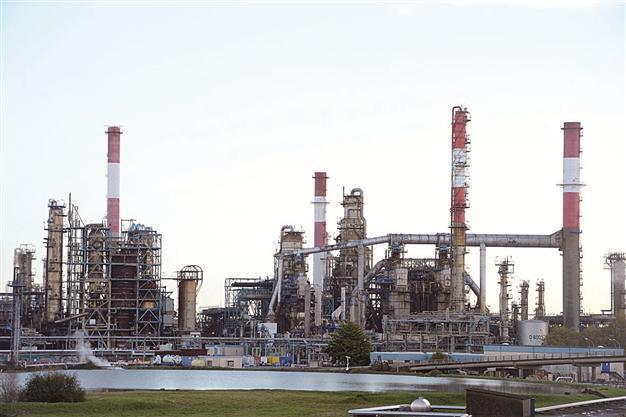Turkey exports support Mediterranean refineries: Agency
LONDON - Reuters

‘In the last three years, European refiners in the Mediterranean basin, particularly in Spain and Greece, have seen a surprising revival,’ the IEA said. AFP Photo
Increasing demand for fuel from North Africa and Turkey is keeping Greek, Spanish and Italian refineries in business, the International Energy Agency said in its monthly oil report, even while their domestic economies slump.
The picture for Mediterranean refineries is bright by contrast with those in the north, where overcapacity and a lack of investment has led to a slide in margins and plant closures.
“In the last three years, major European refiners in the Mediterranean basin, particularly in Spain and Greece, have seen a surprising revival in refining throughputs, bucking the trend in domestic oil demand,” the IEA report said.
Turkey’s imports of gasoil have grown by around 16 percent from 2010 to the first quarter of 2013, or by 40,000 barrels per day to 200,000 bpd, most of that growth supplied by Greek refineries, the report said.
Competition on rise
Significant investment in Spanish refineries has enabled them to become competitive compared with those in north-western Europe, which are often relatively simple and inefficient, the IEA said.
It said Spanish exports of gasoil had risen in the past two years by 10 percent or 20,000 bpd to France and by 71 percent or 40,000 bpd to Italy.
Mediterranean refineries, like their peers in the north of the continent, still face considerable headwinds, however.
In recent weeks and months, competition has increased as Russia has expanded diesel exports to Europe, while costs have risen for Urals crude and West African crudes.
Emerging economies will be the main force in the global oil market next year, driving demand to a record high level, International Energy Agency (IEA) data showed yesterday.
Raising its demand forecast this year because of unseasonally cold weather, the IEA also signalled that in 2014 emerging economies will drive demand to a record 92.0 million barrels per day.
The agency said improving prospects for global economic growth would pull demand, despite increasing efficiency in energy use in advanced countries.
But the overall tone of the IEA monthly report suggested that the oil market is heading into a sea of uncertainty, partly because oil production in the United States is “set to grow strongly”.
Supply from other countries outside the Organization of Petroleum Exporting Countries (OPEC), notably Brazil, Kazakhstan and South Sudan, would also rise, the agency forecast.
“Emerging markets and developing economies are forecast to lead demand growth in 2014,” the IEA said.
This would more than offset continued shrinkage of demand in the 34 countries in the OECD area, with China forecast to remain “the main engine of demand growth in 2014.” For this year, because of a big increase in demand for heating oil in the northern hemisphere in the second quarter, the agency raised its estimate for global oil demand by 215,000 barrels per day (bd).
This took the overall estimated annual growth to 930,000 bd, and total consumption to 90.8 million barrels per day (mbd).
















